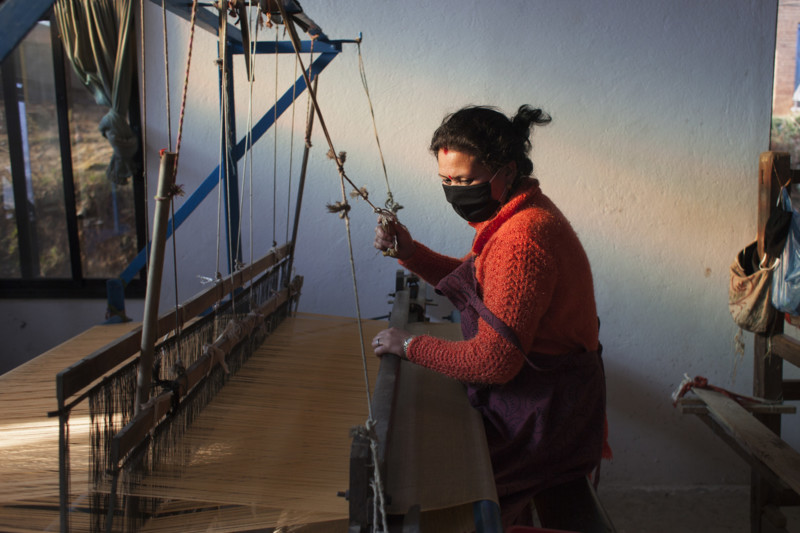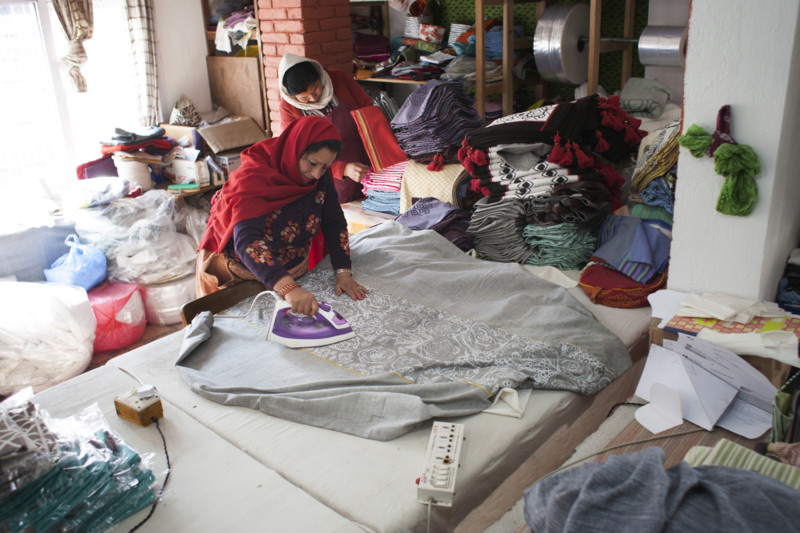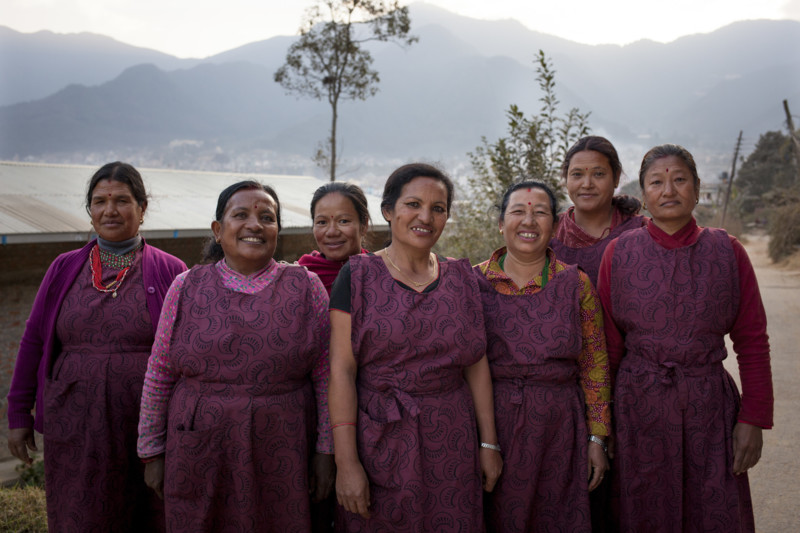
Fairtrade Fortnight: Why It Matters
Oxfam worker Kate Bensen recently spent time in Nepal, meeting women who make some of the fair trade products sold in Oxfam stores. Here, at the start of Fairtrade Fortnight, she shares her story of seeing firsthand the life-altering difference of trading fairly.
Driving through the streets of Kathmandu four years on from the devastating earthquake, I’m shocked at how much hasn’t been rebuilt yet – there are still piles of rubble where buildings once stood and deep cracks remaining in others. Another thing that’s very different from my last visit is how much dust is in the air – it’s all-encompassing, with most people choosing to wear a face mask every time they leave the house, and all doors and windows that face the small and dusty streets permanently closed.
Today we’re on our way to visit one of Oxfam Trading’s artisans who weaves the fabric that is then screen-printed by hand, sewn into tablecloths and sent for sale to the other side of the world in Oxfam shops in Australia. I’m told by the local team that the workshop of this producer was severely damaged in the earthquake and I wonder what it looks like now.
As I step out of the car I can hear the sound of hand-loom machines clicking loudly, and I follow this into a one-room workshop that’s attached to a small house. The sun is low in the afternoon sky and golden light is filling the entire workshop through the windows. Light is bouncing off all the coloured threads as women click the looms back and forth, and it’s truly enchanting. The manager of the workshop, Durga, turns and makes eye contact with me and bursts into a huge smile.
Durga was trained by World Fair Trade Organization (WFTO) member Association for Craft Producers (ACP). She worked there for almost six years and then wanted to start her own workshop at home.
“About the inspiration to start my own business,” Durga explains, “ACP has supported us a lot and I thank them for that. My sisters here are also giving me inspiration, which in turn gives me courage that I can work. There are nine women that work here with me. All are my relatives, the wives of my brothers. Some are my own sisters, some are my brothers’ wives and some are my cousins’ wives.
“I feel proud that I am able to provide employment to those who didn’t have work. Rather than looking for farm labour work, we can work together and be together. We can share our ups and downs of life, and also work. I am happy with that.”
Durga tells me that after the earthquake, ACP helped her reconstruct her workshop, provided support to repair and maintain her family’s home and offered her further skill training and social benefits, such as a medical allowance and educational scholarships for their children. From Oxfam, Durga has received further fabric-weaving training for quality improvement and some tools for weaving products.
“There is a difference [from before], because we didn’t know much in the beginning. I didn’t know how to do all of this. But after taking responsibility, I learnt and now I have some ideas on how to do the work. And I know now, so it made [a] difference.”

It felt special sitting with Durga in her home and workshop, with all of her sisters, knowing that they were earning a fair wage and loving their work. After spending the last few weeks meeting women in Nepal who were married as children – some as early as six years old – and unable to earn an income, it was overwhelmingly encouraging to hear such strength and success from an unmarried woman, able to support herself and her family so wholly. “I am not married. Neither is my elder sister,” Durga says with a proud smile. “In a way, I’m free to go anywhere… I am most happy about that.”
I ask Durga how she feels about working for a Fairtrade certified supplier and what this means directly for her. “There are many things I want to say but I would like to thank you all for buying our products, because it gives us employment and we don’t have to remain unemployed.
“Because of them, we have been able to have two meals a day. Without work, we won’t be able to feed ourselves, and now we have work. Please give my regards to all of them and also express my gratitude.
“What can I say, you got an education and can converse in English, but we didn’t have such opportunity. So please tell them for me.”
As Durga and I continue chatting, one of her sisters comes in with traditional Nepali sweets on a plate, accompanied by delicious homemade chai tea. “It’s for celebration!” her sister explains to me. After a little more probing, I find out that modest Durga has just been awarded for being one of the ACP’s best cloth suppliers. She tells me this has been the happiest moment in her life so far – and from someone so proud of their craft, I know it’s true.
After facing the painful task of trying to choose which incredible cloths to purchase, the sisters gather all around me and I hug each of them. This has been my favourite day of the entire trip, and another reminder of why buying fair trade products is so important.



